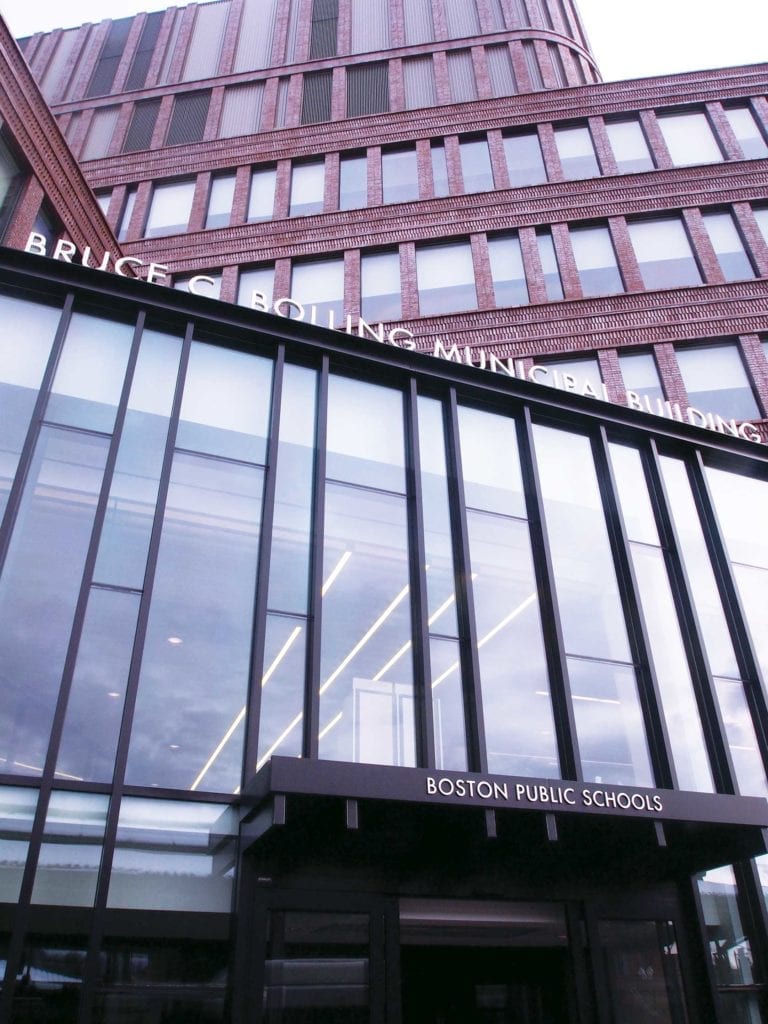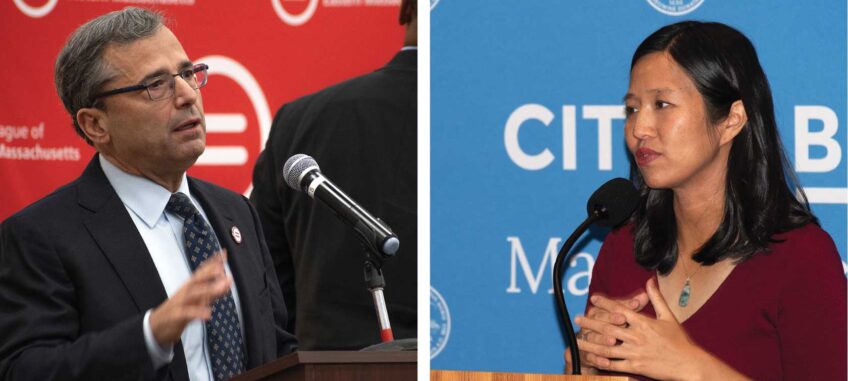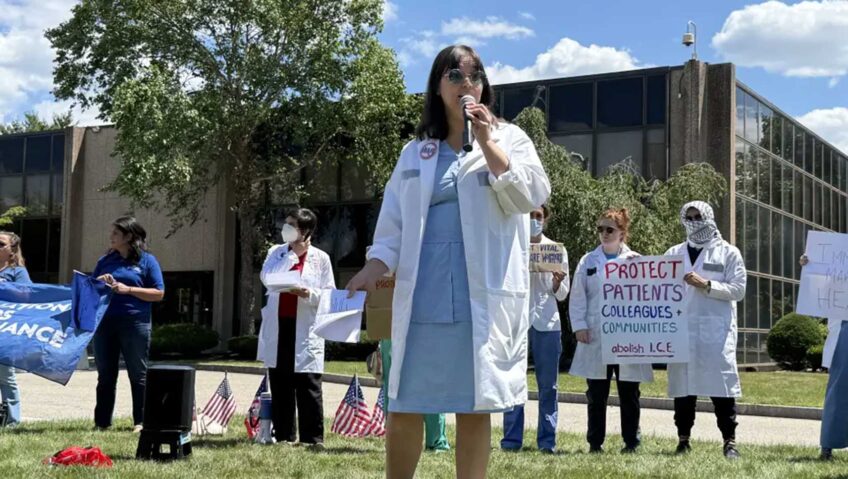
When three finalists contending for the Boston Public Schools superintendent post were announced last week, a process that thus far has been conducted out of public view suddenly entered the spotlight.
All three candidates are people of color. One is Boston-based. None has served as superintendent in a large district. The candidates are:
Brenda Cassellius, the former commissioner of Minnesota’s Department of Education. Cassellius served eight years as commissioner and is credited with spearheading an increase in funding for Minnesota’s schools, enacting all-day kindergarten and expanding preschool for 25,000 students in the state.
Marie Izquierdo, the chief academic officer for the Miami-Dade County Public Schools, a district with 350,000 students. Izquierdo is credited with boosting test scores, narrowing achievement gaps and increasing high school graduation rates during her tenure. Izquierdo is a graduate of the organization Chiefs for Change, founded by former Florida Gov. Jeb Bush and the Broad Academy, funded by the Eli and Edythe Broad Foundation.
Oscar Santos, the head of school at Cathedral High School, a Catholic school in Boston’s South End. Santos, a graduate of Boston Latin School, served as superintendent of the Randolph Public Schools from 2010 to 2013, when he declined to renew his contract, citing differences with the town’s school committee. As head of Cathedral, Santos has participated in meetings of the Boston Compact, a group of BPS, Charter and Catholic schools organized to foster collaboration between the three sectors.
At-large City Councilor Annissa Essaibi-George noted that all three candidates have served as teachers.
“It’s really important that we have a superintendent who has spent a part of their career in the classroom,” she said.
Issues: achievement gaps, funding
Whichever candidate is selected will face a system at a crossroads. By many metrics, including standardized test scores, graduation rates and college completion rates, Boston’s schools perform better than those in any major city in the United States. At the same time, the city’s schools struggle with a daunting gap between the outcomes of the predominantly low-income Latino and black students who make up a majority of those in the system and the more middle-class white minority in the system.
A factor that could exacerbate those achievement gaps is the increasing segregation in Boston’s public schools, which in 2014 switched from a three-zone school assignment lottery system to a neighborhood-weighted lottery system that places students in schools based on their proximity to the school buildings.
Many Boston schools also are struggling with years of funding shortfalls, with cuts to their budget or nominal funding increases that haven’t kept pace with their rising costs. Although the Walsh administration touts a $26 million increase to its $1.139 billion fiscal year 2020 budget, the 2 percent increase is far lower than the 5 percent increase in the overall city budget.
At the same time, state funding for Boston’s district schools has plummeted from nearly one-third of the BPS budget in the wake of the 1993 Education Reform Act to less than 10 percent in the year 2020 budget. Much of that funding has departed to charter schools, which draw from the state’s Chapter 70 education dollars allocated to Boston.
Parents and the mayor
The next superintendent will also face pressure from parents seeking a greater voice in a system that for a quarter-century has been controlled by the mayor. Boston voters abolished the city’s elected school committee in a 1992 vote in favor of a seven-member body appointed by the mayor.
Some mayoral appointees have children enrolled in BPS schools, but activists decry the superintendent search process, wherein a list of 39 candidates was whittled down to three with limited parent participation.
“Parent and community involvement is really critical for school policies and positions, including the hiring for the new superintendent,” said Lawyers for Civil Rights Executive director Ivan Espinoza-Madrigal. “Ideally, this process would have incorporated a more robust parent and community perspective.”
The search process, and its resulting selection of three candidates, has reignited calls for a return to an elected school committee. Parent activists and city councilors, including Essaibi-George, have been discussing the idea of a return to an elected or hybrid elected/appointed body as frustration builds with decisions made by the mayor and appointed school committee.
Mayoral control over the schools is, in itself, another challenge for a superintendent in Boston. Throughout the tenure of former Superintendent Tommy Chang, who served from 2015 to 2018, Walsh was often seen intervening in BPS policy. When Chang in 2016 formed a committee to explore an alternative to the current exam school admission policies. Walsh immediately shut down the initiative, telling reporters, “I don’t think it’s the right time to be talking about it.”
Despite the history of tight control from City Hall, Essaibi-George stressed that the next superintendent must be given autonomy.
“We’re hiring them to be the leader of the school district,” she said. “They do need to be independent. They have to demonstrate independence in their decision-making skills.”
Barbara Fields, a member of the Black Educators Alliance of Massachusetts, said, “The real question is: Can the mayor accept the independence of a candidate who can run the schools?”
Education policy
Since 2011, Boston has been a member of the Washington-based Center on Reinventing Public Education’s Portfolio Network, which advances a model for education reform that views schools in the same way an investment manager views the stocks in a portfolio. Under the model, funding for schools is tied to students and schools are judged by the students’ performance on standardized tests. Schools deemed under-performing are closed or reorganized, often under the control of a private contractor. In Boston for example, the Up Academy charter school network runs the Holland school as a district school and operates charter schools in the former Patrick F. Gavin Middle school and Marshall Elementary school.
While BPS officials have not actively participated in the Center or Reinventing Public Education network in recent years, the district nevertheless appears to have implemented all components of the model to varying degrees.
Boston parents and teachers have pushed back on many of the components of the model, including student-based funding. In the last two budget cycles, parents called for baseline budgets that would enable all schools to have components seen as necessary, such as libraries or school nurses, regardless of fluctuations in enrollment.
Critics of student-based funding note that schools losing funding tend to be concentrated in high-poverty neighborhoods where student needs are higher. Cutting essential services in those schools can, therefore, have a disproportionate impact on students with the highest need.
Parents have also chafed at school closings in Boston. Last year, parents and teachers fought unsuccessfully against the closure of the West Roxbury Education Complex and successfully fended off the district’s attempt to close the McCormack Middle School.
As City Hall moves forward with its $10 billion Build BPS capital improvement plan, school closures could continue to complicate the politics of the school system and add more stress to the superintendent’s job.
The right stuff
To navigate the complex dynamics surrounding the school system, the next superintendent will need political skills to balance the demands of parents, elected officials, local business leaders who often weigh in on education policy, and the mayor.
“It’s really important that they’re able to work with all the different stakeholders in Boston and engender more trust in how the district is run,” said Boston Teachers Union President Jessica Tang. “We do need a champion for BPS. Someone who can successfully mobilize all the good will need to make sure BPS schools provide students a world-class education.”







